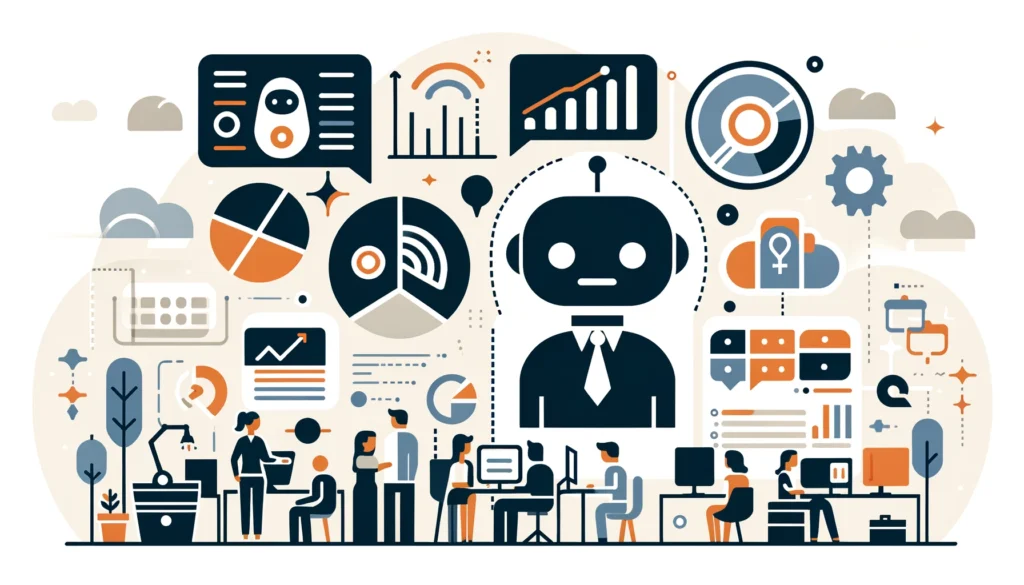Revolutionizing the Workplace: How AI is Transforming Business Processes

Artificial Intelligence (AI) is not just reshaping; it’s revolutionizing the workplace. This technology, once a figment of science fiction, has become a vital part of how businesses operate and compete in a fast-paced, global economy. This article dives into the transformative role of AI in business processes, exploring its evolution, applications, and the profound impact on the workplace environment. We’ll navigate through the realms of AI, from predictive analytics to ethical challenges, highlighting how AI is not just an addition but a necessity in modern business practices.
Understanding AI and Its Business Applications
Unraveling the Complex World of AI in Business
AI in business isn’t just about automation; it’s about enabling smarter, more efficient decision-making. It’s a symphony of technologies, including machine learning, where algorithms improve from experience without explicit programming, and natural language processing, which allows machines to understand and respond to human language nuances. In robotics, AI empowers machines to execute tasks with precision, often surpassing human capabilities.
Transformative Applications Spanning Various Sectors
In marketing, AI’s role in understanding customer preferences has revolutionized targeted advertising. AI algorithms analyze consumer behavior, enabling personalized marketing strategies that drive engagement and sales. In finance, AI’s prowess in identifying fraudulent activities is unparalleled, safeguarding assets with robust algorithms. For human resources, AI transforms recruitment, scouring through vast applicant pools to identify the best fit, a task impractical for humans alone. In operations, AI’s predictive maintenance anticipates equipment failures, minimizing downtime and saving costs.
Real-World Examples that Amaze and Inspire
Imagine an AI system predicting consumer trends with uncanny accuracy, allowing businesses to prepare for market shifts proactively. In customer service, AI chatbots, equipped with sophisticated understanding, guide customers through complex troubleshooting, turning a potential frustration into a delightful experience. These applications not only enhance efficiency but also create innovative ways to connect with and serve customers.
AI in Project Management: Enhancing Efficiency and Decision-Making
Project management is being redefined by AI. Gone are the days of static Gantt charts and manual resource allocation. Today’s AI-driven project management tools foresee project trajectories, identifying bottlenecks before they become roadblocks. They allocate resources dynamically, ensuring optimal use of every asset, from human expertise to financial investments.
Imagine a project manager equipped with an AI tool that not only tracks progress but also predicts potential delays, offering solutions before problems arise. This predictive capability transforms project management from a reactive to a proactive discipline, dramatically increasing the chances of project success.
Transforming Customer Service with AI
Customer service has entered a new era with AI. AI chatbots, with their ability to handle thousands of queries simultaneously, have redefined customer interaction. These bots provide instant, accurate responses, but they do more than just answer questions. They learn from each interaction, continuously improving their ability to serve customers better.
However, the magic of AI in customer service lies in its ability to personalize interactions. Imagine a chatbot that not only answers your question but also remembers your preferences from previous interactions, offering tailored recommendations, much like a knowledgeable sales assistant who knows your tastes and preferences.
AI-Driven Data Analysis: A Game-Changer for Business Strategy
AI-driven data analysis is reshaping business strategy from the ground up. It’s about harnessing the power of big data – transforming it from an overwhelming flood of information into actionable insights. AI algorithms sift through data at a speed and accuracy that’s humanly impossible, uncovering trends, predicting market shifts, and identifying new business opportunities.
Consider a retailer using AI to analyze customer purchase patterns, enabling them to stock products that are likely to sell out, based on real-time market trends. Or a financial analyst using AI to sift through decades of market data to identify investment opportunities that would have otherwise gone unnoticed.
Ethical Considerations and Challenges in AI Implementation
The implementation of AI is not without its ethical quandaries and logistical challenges. Privacy and data security are paramount, as AI systems often handle sensitive information. The threat of biased algorithms is real if the data fed into AI systems isn’t diverse and representative. Furthermore, implementing AI is not just a technical challenge but a cultural one, requiring businesses to adapt to new ways of working and thinking.
Imagine navigating the complexities of integrating AI into existing systems, or the challenge of ensuring AI decisions are fair and unbiased. These challenges are as much a part of AI’s journey as its technological marvels.
Real-World Success Stories: Companies Excelling with AI
From small startups to global conglomerates, companies across industries are leveraging AI to revolutionize their operations. In healthcare, AI is being used to predict patient health risks, enabling proactive care. In retail, AI-driven personalization has led to unprecedented levels of customer loyalty and sales. These stories are not just testaments to AI’s potential but also to the ingenuity of businesses in applying AI to real-world problems.
Conclusion: Embracing AI for a Competitive Edge in Business
As we’ve explored, AI’s impact on business is profound and far-reaching. From enhancing efficiency in project management to driving strategic decisions through data analysis, AI is not just an optional tool but a crucial component for any business aiming to thrive in today’s digital landscape. The future of business is inextricably linked with the future of AI, presenting an exciting horizon of possibilities and challenges. Embracing AI is not just about staying competitive; it’s about reimagining what’s possible in the business world.